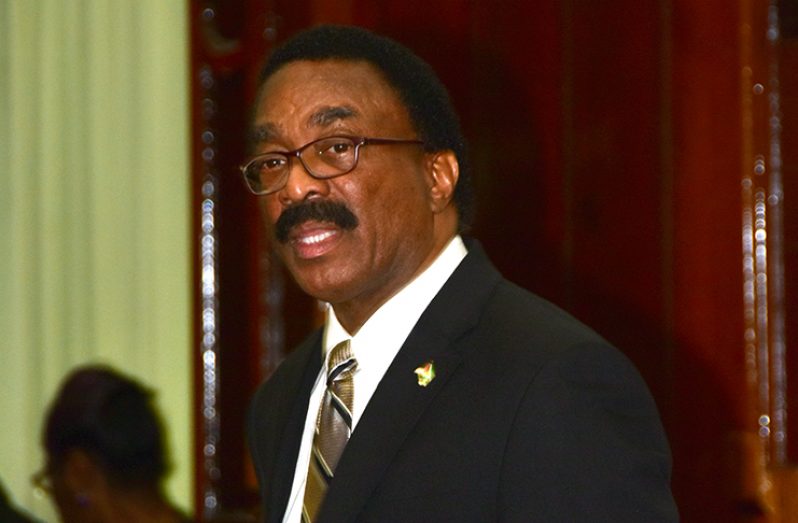– as gov’t excises contentious sedition clause
THE contentious Cybercrime Bill was late Friday night passed in the National Assembly with amendments to two clauses that had allegedly infringed on press freedom and freedom of expressions.
But despite those amendments, the Bill, which carries rigid penalties for acts of child pornography, child luring, cyber-bullying and identity theft among other offences committed in cyberspace, was heavily criticised in part by the Opposition People’s Progressive Party (PPP), which had also tabled an amendment for the entire Clause 18 (Sections 1-4) to be deleted with respect to the offences of sedition. That proposed amendment was not allowed.
Ahead of the debates, Clause 18 had come in for major criticism, as it was deemed in certain quarters as an assault on press freedom in that it was felt that it criminalised anyone who uses a computer to bring, or attempt to bring into hatred or contempt, disaffection towards the government.
But on Friday as he stood to defend the Bill that he tabled, Attorney-General and Minister of Legal Affairs, Basil Williams told the House that in response to the criticisms, the Bill was referred back to Cabinet for their consideration. It was at that level, he said, that a decision was made to delete Sub-section (1)(a) which was the main cause of concern.
He pointed out that in addition to the deletion of Sub-section (1)(a), other changes changes were made.
Said he: “Clause 18 has since been revised by the Drafting Division in collaboration with a free speech and media attorney from ISLP. The changes made to this clause and other clauses of the Bill demonstrate that this government is receptive to criticism, and committed to the democratic process.”
The now ammended Clause 18 provides for offences against the State.
“Some of these offences,” Minister Williams explained, referencing parts (b) and (c), “are where a person intentionally publishes, transmits or circulates by use of a computer system, statement or words either spoken or written text, video, image, sign, visible representation that-encourages, incites, induces, aids, abets, counsels any person to commit, participate in the commission of, or to conspire with another person to commit any criminal offence against the President or any member of the government.”
Like Clause 18, Clause 9 was also a subject of contention, with the Opposition and civil society contending that it was intended to muzzle whistleblowers by targetting them.
The original Clause 9 made the unauthorised receiving, giving or obtaining of access to electronic data an offence.
CAREFUL CONSIDERATION
Minister Williams said that the government, taking into consideration the concerns raised by the media watchdog group, “Reporters Without Borders” that this clause could be used to penalise journalists and media for publishing reports based on information from a confidential source, amended it.
“The amendment has resulted in the removal of the provision that may pose an obstacle to the freedom of the press; that is, the criminal aspect of receiving the electronic data. The type of conduct being criminalised has now been revised and is more specific. The types of electronic data to which this clause refers to have also been defined to include commercially sensitive data, a trade secret or data which relates to national security,” the Legal Affairs Minister explained.
Former Attorney-General Anil Nandlall, who now sits on the opposite side of the House, said that in this age of technology, no one could seriously dispute the importance of Cybercrime Legislation, and as such the Bill was a timely intervention.
He, however, alleged that in amending it, the concerns raised by organisations such as the Guyana Press Association (GPA), the Guyana Trades Union Congress (GTUC) and the PPP, and even ordinary citizens were not taken into full consideration.
In addition to Clauses 9 and 18, Nandlall expressed concern over Clause 17. “There is a serious problem with Clause 17 as well,” he told the House. While acknowledging and accepting that the Opposition Members of Parliament were absent from many of the meetings held by the Parliamentary Special Select Committee, said that they will take responsible for the “contentious” Clauses being incorporated into the bill.
“What we would not accept responsibility for is the inclusion of Clause 18 in the bill, and we will not take responsibility,” he emphasised. He complained that even if the Opposition Members were present, they lacked the voting powers to make amendments especially without the support of Government Members.
Opposition Chief Whip Gail Teixeira also expressed serious concerns over Clauses 9 and 18 though they were amended.
Prime Minister Moses Nagamootoo, in defense of the Bill, told the House that the government, through the legislation, is by no means prohibiting the use of the Internet or the flow of information but rather what is being addressed is the use of the Internet and technological devices for criminal purposes.
“We are way behind the movement in the world to protect our civilisation from those who are bent on perpetrating criminal intent via computer, not legitimate lawful purposes, criminal purposes,” he said.
In wrapping up the debates, Minister Williams reminded the House that Mark Benschop and Philip Bynoe were initially charged with sedition, and that after Bynoe was freed, the PPP government then moved to charge Benschop with treason. The latter was eventually pardoned after serving five years in solitary confinement.
He said contrary to the Opposition’s claims, the nation’s youths will be protected, and that the Bill was consulted upon widely.
Punishments under the Bill range from multiple-year jail sentences, to fines of up to $20M for those found guilty.



.jpg)











